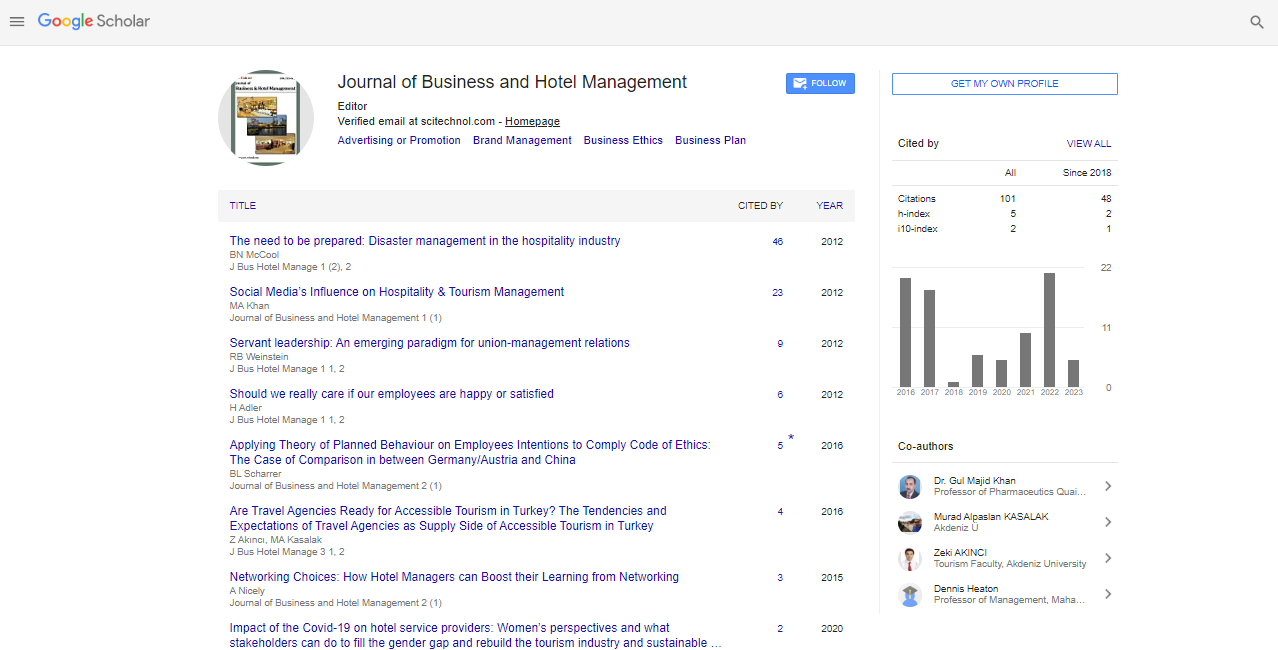Opinion Article, J Bhm Vol: 9 Issue: 2
Service Marketing: Strategies for Producing Exceptional Customer Experiences and Building Brand Loyalty
Pedro Garrido*
Department of Marketing, Varna University of Management, Varna, Bulgaria
*Corresponding Author: Pedro Garrido
Department of Marketing, Varna University of Management, Varna, Bulgaria
E-mail: garridop@gmail.com
Received date: 15 May, 2023, Manuscript No. JBHM-23-107995;
Editor assigned date: 17 May, 2023, PreQC No. JBHM-23-107995 (PQ);
Reviewed date: 31 May, 2023, QC No. JBHM-23-107995;
Revised date: 08 June, 2023, Manuscript No. JBHM-23-107995 (R);
Published date: 16 June, 2023, DOI: 10.4172/2324-9129.1000140
Citation: Garrido P (2023) Service Marketing: Strategies for Producing Exceptional Customer Experiences and Building Brand Loyalty. J BHM 9:2.
Description
In today's highly competitive business landscape, service marketing has become a precarious aspect of producing a strong brand identity and fostering lasting customer relationships. Unlike traditional product marketing, which focuses on tangible goods, service marketing revolves around intangible offerings, such as experiences, expertise, and personalized interactions. To succeed in the service industry, businesses must understand the unique challenges and opportunities that arise in this domain. In this comprehensive guide, we will explore the key principles, strategies, and tactics that can help businesses excel in service marketing, delight customers, and build brand loyalty.
Understanding the service marketing landscape
Service marketing centers around delivering intangible value to customers, making it vital for businesses to grasp the intangible elements that drive consumer perceptions. Core aspects of service marketing include:
Intangibility: Services are not physical objects and cannot be touched or seen before purchase, making their evaluation more subjective.
Inseparability: Services are typically produced and consumed simultaneously, meaning customers are actively involved in the service delivery process.
Variability: Service quality can vary due to human interactions and other factors, presenting challenges in maintaining consistency.
Perishability: Services cannot be stored or inventoried, requiring efficient capacity management to meet demand.
Crafting a service marketing strategy
To excel in service marketing, businesses must develop a comprehensive strategy that aligns with their brand values and customer expectations. Key components of an effective service marketing strategy include:
Identifying the target audience: Understanding the needs, preferences, and pain points of the target audience is essential for producing tailored services that resonate with customers.
Developing unique value propositions: Differentiate services by highlighting the unique benefits they offer compared to competitors. Emphasize factors such as convenience, expertise, and personalized attention.
Building a service culture: Delivering exceptional services requires a service-oriented culture within the organization. Encourage and train employees to prioritize customer satisfaction.
Leveraging technology: Embrace technology to streamline service processes, enhance customer interactions, and gather valuable feedback for continuous improvement.
Delivering outstanding customer experiences
In service marketing, customer experiences play a pivotal role in shaping perceptions and building loyalty. To produce memorable experiences, consider the following:
Personalization: Tailor services to meet individual customer needs, preferences, and buying behaviors.
Service recovery: Mistakes are inevitable, but effective service recovery can turn a dissatisfied customer into a loyal advocate.
Employee empowerment: Empower employees to make decisions that prioritize customer satisfaction, thereby improving service delivery.
Omnichannel engagement: Offer seamless customer experiences across various touchpoints, including online platforms, social media, and physical locations.
Building brand loyalty through service marketing
Brand loyalty is a result of consistently delivering excellent services and exceeding customer expectations. To foster loyalty, businesses should focus on:
Relationship marketing: Cultivate long-term relationships with customers through ongoing communication, loyalty programs, and personalized offers.
Social proof and testimonials: Encourage satisfied customers to share their positive experiences through reviews and testimonials, boosting trust and reliability.
Continuous improvement: Actively seek customer feedback and use it to refine and enhance service offerings.
Employee advocacy: Happy employees are more likely to provide exceptional service, leading to increased customer satisfaction and loyalty.
Conclusion
Service marketing is a dynamic and intricate discipline that requires businesses to prioritize customer experiences, embrace innovation, and foster a service-oriented culture. By understanding the unique challenges and opportunities presented by services, crafting an effective marketing strategy, and consistently delivering exceptional experiences, businesses can produce a strong brand identity, build lasting customer relationships, and thrive in the competitive service industry.
 Spanish
Spanish  Chinese
Chinese  Russian
Russian  German
German  French
French  Japanese
Japanese  Portuguese
Portuguese  Hindi
Hindi 